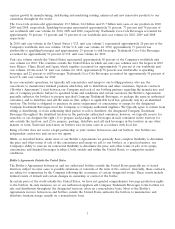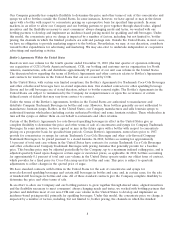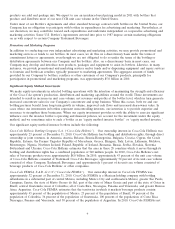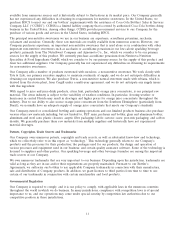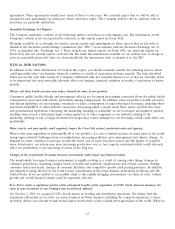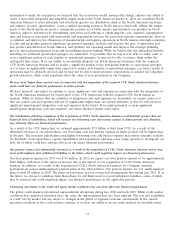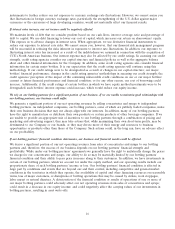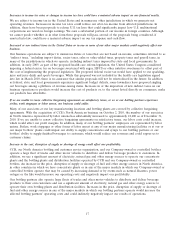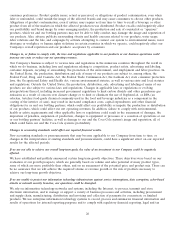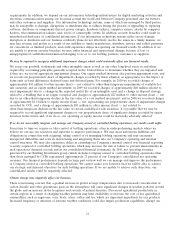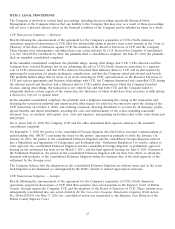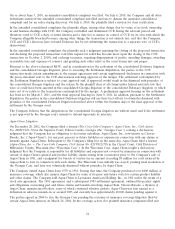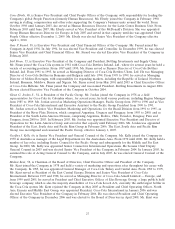Coca Cola 2010 Annual Report Download - page 19
Download and view the complete annual report
Please find page 19 of the 2010 Coca Cola annual report below. You can navigate through the pages in the report by either clicking on the pages listed below, or by using the keyword search tool below to find specific information within the annual report.Increases in income tax rates or changes in income tax laws could have a material adverse impact on our financial results.
We are subject to income tax in the United States and in numerous other jurisdictions in which we generate net
operating revenues. Increases in income tax rates could reduce our after-tax income from affected jurisdictions. In
addition, there have been proposals to reform U.S. tax laws that could significantly impact how U.S. multinational
corporations are taxed on foreign earnings. We earn a substantial portion of our income in foreign countries. Although
we cannot predict whether or in what form these proposals will pass, several of the proposals being considered, if
enacted into law, could have a material adverse impact on our tax expense and cash flow.
Increased or new indirect taxes in the United States or in one or more of our other major markets could negatively affect our
business.
Our business operations are subject to numerous duties or taxes that are not based on income, sometimes referred to as
‘‘indirect taxes,’’ including import duties, excise taxes, sales or value-added taxes, property taxes and payroll taxes, in
many of the jurisdictions in which we operate, including indirect taxes imposed by state and local governments. In
addition, in early 2009, as part of the proposed health care reform legislation, the United States Congress considered
imposing a federal excise tax on beverages sweetened with sugar, HFCS or other nutritive sweeteners to offset part of
the cost of implementing the proposed legislation. The proposed federal excise tax would have applied to our sparkling,
juice and juice drink and sports beverages. While this proposal was not included in the health care legislation signed
into law in March 2010, there is no assurance that similar proposals will not be reintroduced in the future. In addition,
as federal, state and local governments experience significant budget deficits, some lawmakers have proposed singling
out beverages among a plethora of revenue-raising items. Increases in or the imposition of new indirect taxes on our
business operations or products would increase the cost of products or, to the extent levied directly on consumers, make
our products less affordable.
If we are unable to renew collective bargaining agreements on satisfactory terms, or we or our bottling partners experience
strikes, work stoppages or labor unrest, our business could suffer.
Many of our associates at our key manufacturing locations and bottling plants are covered by collective bargaining
agreements. With the acquisition of CCE’s North American business on October 2, 2010, the number of our associates
in North America represented by labor unions has substantially increased to approximately 18,600 as of December 31,
2010. If we are unable to renew collective bargaining agreements on satisfactory terms, our labor costs could increase,
which would affect our profit margins. In addition, many of our bottling partners’ employees are represented by labor
unions. Strikes, work stoppages or other forms of labor unrest at any of our major manufacturing facilities or at our or
our major bottlers’ plants could impair our ability to supply concentrates and syrups to our bottling partners or our
bottlers’ ability to supply finished beverages to customers, which would reduce our revenues and could expose us to
customer claims.
Increase in the cost, disruption of supply or shortage of energy could affect our profitability.
CCR, our North America bottling and customer service organization, and our Company-owned or controlled bottlers
operate a large fleet of trucks and other motor vehicles to distribute and deliver beverage products to customers. In
addition, we use a significant amount of electricity, natural gas and other energy sources to operate our concentrate
plants and the bottling plants and distribution facilities operated by CCR and our Company-owned or controlled
bottlers. An increase in the price, disruption of supply or shortage of fuel and other energy sources in North America,
in other countries in which we have concentrate plants or in any of the major markets in which our Company-owned or
controlled bottlers operate that may be caused by increasing demand or by events such as natural disasters, power
outages or the like would increase our operating costs and negatively impact our profitability.
Our bottling partners also operate large fleets of trucks and other motor vehicles to distribute and deliver beverage
products to their own customers and use a significant amount of electricity, natural gas and other energy sources to
operate their own bottling plants and distribution facilities. Increases in the price, disruption of supply or shortage of
fuel and other energy sources in any of the major markets in which our bottling partners operate would increase the
affected bottling partners’ operating costs and could indirectly negatively impact our results of operations.
17


